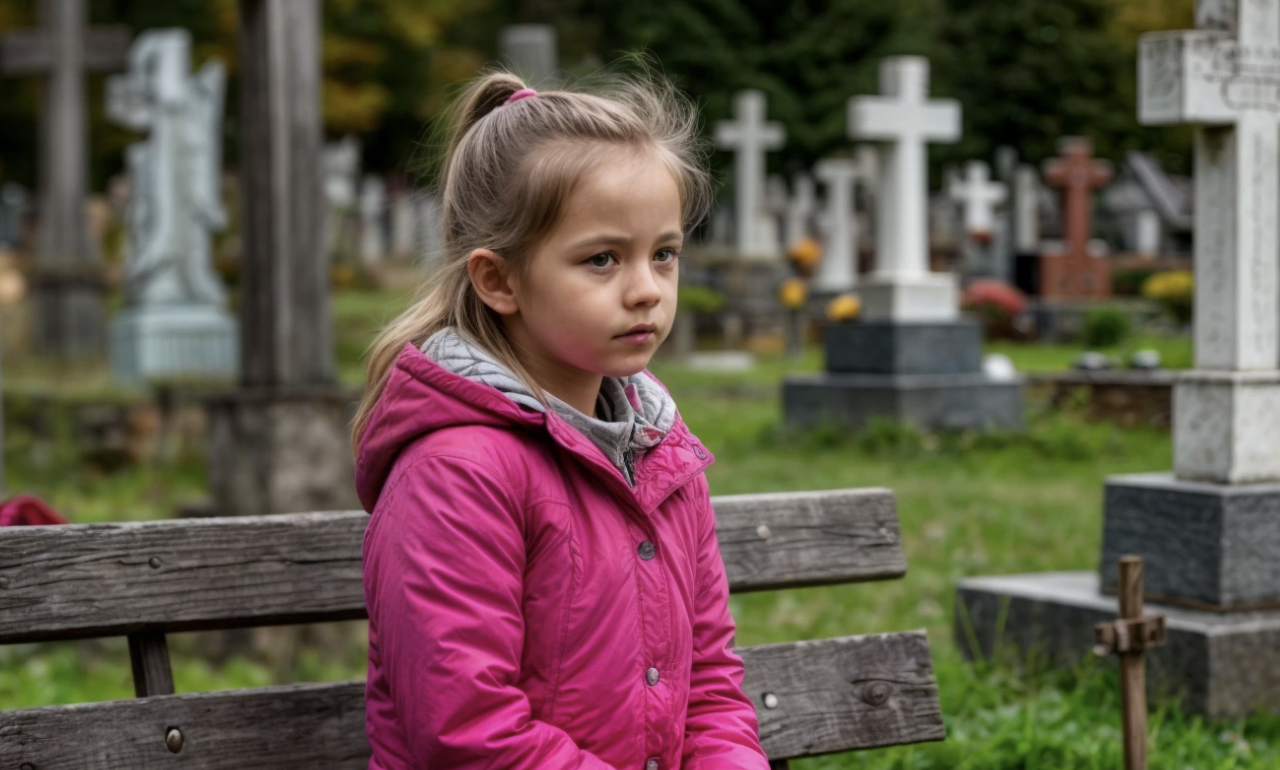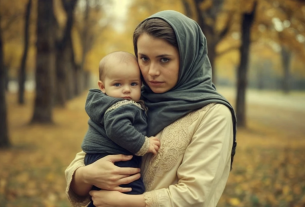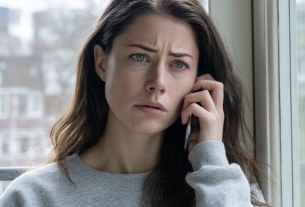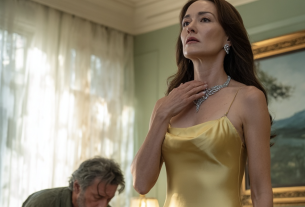Through the heavy curtains, the last rays of evening light seeped in, spreading across the expensive Persian rug in weary, dull streaks. The air in the living room—usually scented with rare flowers and exquisite perfume—felt heavy today, electrified, charged with the sense that a storm was coming.
“Katya again? Valery, do you seriously think I’m obliged to look after her?” Kristina’s voice—usually soft and seductive—trembled with barely restrained fury. She stood in the middle of the room, flawless in a silk robe, as if carved from porcelain, throwing her husband a defiant look. “She has a nanny! And your ex-wife—and her grandmother! Why do I have to drop everything again?”
Valery, a man with gray at his temples and a solid, assured posture, did not lift his eyes from the papers. His calm was false, like the stillness before a storm.
“We’ve talked about this, Kristina. Twice a month. Two Saturday evenings. This isn’t a request; it’s the bare minimum you accept as my wife. Zinaida needs a rest. And my ‘ex-wife,’ if that’s how you prefer to call her, lives in another city and rarely sees her granddaughter. Katya is my blood. And, by the way, she’s Olga’s daughter. Your former friend.”
He said the last words with the faintest emphasis, but Kristina felt it like a blow. That connection infuriated her more than anything.
“Friend…” she gave a bitter little laugh. “The same Olga who dropped everything and had a child by whoever it was, leaving you to deal with the fallout?”
The words burst out before she could stop them. Kristina fell silent at once, biting her lip. A chill ran down her back. She saw Valery slowly set the documents aside and raise his eyes to her—heavy, emotionless. A memory surged up from six months ago: Katya had accidentally spilled juice on the couch, Kristina grabbed her by the arm and screamed in her face—and then he appeared. No shouting, no gestures. He came over, gently moved her hand away and, quietly, with icy clarity, said:
“If you touch her again… if anything happens to her because of you… I will break every one of your fingers. One by one. Do you understand?”
She understood. Then, as now, she realized: this man who had given her luxury and rescued her from poverty did not love her. He tolerated her. And she was afraid of him. Terribly, to the point of trembling. And there was nowhere to run. The thought of returning to that tiny apartment where her drunken parents waited was worse than any punishment. She had locked herself in this gilded prison, and now the jailer was a little girl.
Kristina changed her tone in an instant. Her eyes filled with tears; her voice turned honey-sweet.
“Valerochka, forgive me… I didn’t mean it. I’m just so tired… I have an important doctor’s appointment, I’ve been waiting two weeks, I can’t miss it.”
But Valery was no longer listening. He merely brushed her excuses away like a bothersome gnat. All his attention was fixed on the doorway, from which the ringing laughter of a child floated in. There in the playroom, Katya sat on the floor with the nanny, Zinaida, building a tower of blocks. Valery’s face transformed at once—the sternness melted, his eyes warmed with a tender, almost sacred love. He walked over, scooped the girl up, spun her in the air. Katya squealed with laughter, hugging him around the neck.
From the living room, Kristina watched the scene. Her heart clenched with icy, seething hatred. She was a stranger in this world. Superfluous. A decorative object in a luxurious apartment. And as long as Katya existed, it would always be this way. In her mind—hardened by years of scrabbling for survival—a cold decision took shape. “Don’t be afraid,” she addressed the girl silently. “Today we say goodbye, little obstacle.”
Since youth she had known precisely what she wanted. Beauty was her only weapon and capital. While her friend Olga dreamed of love and wrote poetry, Kristina studied lists of wealthy men. She chose Valery—Olga’s father, twenty-five years older, but possessing everything she craved: power, money, status.
Betrayal? A word that meant nothing to her. She seduced her best friend’s father without hesitation. For Olga, it was devastation. She left, disappeared. A year later Valery learned she had given birth to a daughter. Four years after that—she was gone. An accident.
Crushed by grief and guilt, Valery poured all his love onto his granddaughter, whom he found and brought home. Katya became the center of his life. And Kristina, the young, beautiful wife, ended up on the sidelines. The child was a living reminder of her betrayal and the main obstacle on the road to complete control over her husband and his fortune. The obstacle had to be removed.
The plan was simple and cruel. First—preparation. Under a respectable pretext Kristina got the vigilant Zinaida dismissed, replacing her with young Nina—a student, scatterbrained and forever glued to her phone. That was exactly the point.
On Saturday, when Valery left for a meeting, Kristina watched from the window as Nina took Katya to the playground. She waited. And at last—the nanny’s phone rang; Nina stepped aside, engrossed in the call, leaving the girl alone. Kristina went out, approached, smiled:
“Katya, Grandpa asked me to take you to a magical place. Shall we go?”
The little girl, who trusted “Aunt Kristina,” readily agreed. A minute later they were in the car. In the rearview mirror Kristina saw Nina frantically running around the playground. A triumphant smile curled her lips.
The road stretched on and on. At first Katya gazed out the window with interest; then she began to whimper, and soon—to sob:
“I want Grandpa! I want to go home!”
Kristina drove calmly, turning the music up to drown out the crying. She drove for hours, deeper into nowhere, along rutted roads, until the city was far behind. At last she stopped by the dilapidated fence of an old, abandoned cemetery. Ancient trees cast long, ominous shadows across the overgrown graves.
She dragged the crying girl from the car. The air was damp, smelling of rotting leaves.
“We’re here,” Kristina said. “This is your new home. Grandpa won’t find you. Goodbye.”
Katya, terrified, darted toward the car, but Kristina shoved her roughly away. The girl fell and wailed. To make her shut up, Kristina slapped her across the cheek. Katya froze, staring with eyes full of horror and tears. Kristina got into the car, started the engine, and drove off without looking back. In the mirror, for an instant, a tiny figure flashed on the path, waving her hand by instinct. Then—a turn. And silence. Kristina pressed the gas.
For Valentina, Saturday was a sacred day. Every week she went to the cemetery. In a simple dark dress, a scarf over her head, she walked through the village, avoiding people’s eyes. She needed neither pity nor empty words. This path was hers alone.
Twelve years ago she had moved here. Her ten-year-old daughter Vera was diagnosed with a rare, incurable bone disease. The doctors prescribed quiet and fresh air. Her husband couldn’t take it and vanished. Valentina was left alone.
At first it was unbearable. She withdrew into her grief, caring for her dying child. But the village would not let her go. Neighbors—lively Olga Mitrofanovna and taciturn but kind Nina—came by with food, forced her to rest. Little by little the ice in her heart began to thaw. She learned to accept help. And then—to give it. She realized that pain shared becomes lighter.
Seven years ago, Vera passed away. Many expected Valentina to leave—go back to the city, leave this place behind. But she stayed. The village became her home, its people—her kin. The grief didn’t disappear; it settled inside, turning into a quiet, constant sorrow, part of her everyday life. She made peace with its measured rhythm: tending the garden, helping neighbors, quiet evenings. She wanted nothing more—only found comfort in caring for others.
Today, as usual, she was on her way to the cemetery. On the way she was stopped by Olga Mitrofanovna, who was watering geraniums on her porch.
“Valyusha, off to the graveyard again?” she chided gently. “Remembering is right, but torturing yourself every week is no good. You trouble your girl’s soul and give yourself no peace. Let her go—she’s already where it’s bright and calm.”
“I’ll just sit with her a bit, Mitrofanovna,” Valentina answered softly, with a faint smile. “Not long.”
She nodded to her neighbor and went on—along the narrow path leading to the old cemetery on the outskirts, where, under a spreading birch, her little Vera rested.
Reaching the grave, Valentina stopped. On the bench by the fence sat a little girl. Grimy, shivering, in a thin dress, as if lost in this world. A fresh bruise marked her cheek. She wasn’t crying; she was whispering softly, gazing at Vera’s photograph on the headstone. Valentina listened.
“…I’ll sit with you, all right?” the girl was saying. “You’re Vera, aren’t you? Aunt Kristina said this is my new home. But it’s so scary here alone. It’s not so scary with you. You won’t hit me, will you?”
Valentina’s heart clenched. This frightened child, abandoned in this forsaken place, had found comfort before the image of her daughter. In a child’s logic it was simple: a girl in the photo would understand, protect, not hurt.
Careful not to frighten her, Valentina stepped forward.
“Hello, sweetheart.”
The girl flinched, shrinking into the bench, her eyes wide with fear.
“Who are you? Are you going to hit me too?”
“Of course not, sunshine,” Valentina’s voice was warm, like when she used to rock Vera to sleep. “I’m Aunt Valya. You must be cold.”
She took off her old but warm cardigan and gently wrapped it around the trembling shoulders. The girl watched her warily but didn’t pull away. Warmth, kindness, a quiet voice—and suddenly the tears burst forth like water behind a broken dam. Not from fear, but from relief. She pressed herself to Valentina’s knees, as if she had finally found what she had been missing for so long.
Valentina stroked her tangled hair until the sobs faded to hiccups and then stopped altogether. The girl fell asleep right there in her arms, exhausted and spent. Valentina carefully lifted her and carried her home. On the way, Katya—that was the child’s name, as she had managed to say—clutched her hand tight, as if afraid of being abandoned again. At home Valentina laid her on the couch and covered her with a blanket, but the girl wouldn’t let go of her hand. She had to sit beside her, guarding that fragile sleep.
Katya woke only a few hours later. Seeing Aunt Valya’s kind face, she didn’t panic.
“Aunt Valya, can I call my grandpa? I remember his number. He’ll come get me.”
She recited the numbers. Valentina dialed. On the other end— a sharp, strained male voice, with steel and suppressed panic in it:
“I’m listening!”
Calmly and clearly, Valentina told him where and how she had found the girl. She didn’t hear the squeal of brakes at her gate, but she felt the house tremble when a tall, gray-haired man—Valery—burst inside. Seeing Katya alive and unharmed, he dropped to his knees by the couch. A groan tore from his chest—relief, pain, happiness. He pulled his granddaughter to him, and they both wept: she—from joy, he—from the horror he’d just lived through.
That evening, when Katya had calmed and was drifting to sleep, she whispered:
“Grandpa, can we stay here? With Aunt Valya? Please…”
Valery and Valentina exchanged glances—both embarrassed, both moved. It was impossible to refuse. They sat in the modest kitchen late into the night. They talked. Valery, forgetting his reserve, spoke of his daughter Olga, of guilt, of the love he never had time to show. For the first time in years, Valentina opened her soul to a stranger—she spoke of Vera, of her days, of the quiet that had become familiar. Two lonely souls, united by grief and by a miracle of salvation, found in that conversation the warmth they had lacked for so long.
In the morning, Valery and Katya were getting ready to go home. The farewell was awkward, full of what went unsaid. Before leaving, Katya hugged Valentina tight.
“Aunt Valya, can we come visit?”
Catching Valery’s intent gaze, Valentina nodded.
“Of course, Katyusha. I’ll be waiting.”
When Valery returned to his luxurious mansion, emptiness awaited him—Kristina was gone. Her things had vanished, and so had some of the jewelry and the cash from the safe. She had run, realizing her deceit had been uncovered. Valery felt neither anger nor regret. He filed for divorce without waiting for her and closed that chapter like a dark, unnecessary page.
Life slid into a new groove. The house grew quieter, cleaner. No quarrels, no lies. Just him and Katya. But in the silence of his study, staring out the window, Valery increasingly caught himself on a melancholy. He saw before him a little village kitchen, Valentina’s tired face, her calm voice. He understood: something was missing. And that “something” had a name.
One evening at dinner, Katya, watching him closely, suddenly set down her spoon.
“Grandpa, are you sad? Do you want to see Aunt Valya?”
Valery started.
“How do you know?”
“I can see it,” she said seriously. “You think about her all the time. Why don’t you go if you want to? You told me not to invent obstacles that aren’t there.”
Her words hit the mark. He, a strong man who had made decisions for ten people, sat there afraid to take a step—afraid of seeming weak, ridiculous, intrusive. And in fact, it was simple. He looked at his granddaughter’s earnest little face and burst out laughing—genuinely, from the heart. The decision came at once.
“You’re right, kitten,” he said, getting up. “Let’s pack.”
From early morning a strange agitation had taken hold of Valentina. She stepped out onto the porch and peered into the distance, not knowing what she was waiting for. Her heart beat with the premonition of something important. And then—it happened.
A familiar black car rolled slowly up the street. It didn’t pass by; it stopped right at her gate. Valentina froze. Her heart pounded as if trying to break free.
Katya jumped out of the car.
“Aunt Valya!” her cry rang out across the whole village. She rushed to Valentina, flung her arms around her neck, clinging with her whole little body. Valentina embraced her, breathing in the smell of a child’s hair, and the tears came by themselves.
Next came Valery. He walked slowly, with a slight, almost bashful smile. In his eyes—no cold, no steel, but warmth, hope, a question.
“Valentina…” he began, faltered, searching for words. Then simply, directly, looking into her eyes, he asked, “You won’t drive us away, will you?”
Blushing like a girl, she only shook her head and, quietly but firmly, replied:
“Of course not. Come in. The kettle’s just boiled.”
And behind the fence, peeking out from behind a bunch of dill, stood Olga Mitrofanovna, observing everything. She had seen it all: Katya’s cry, Valentina’s tears, Valery’s look. She grunted, satisfied.
“Well, thank God,” she muttered. “That woman’s suffered enough. Valya’s earned her happiness.”
Tossing the dill into her basket, she hurried toward the shop. Everyone had to be told—the village needed to know. This wasn’t just a visit. It was a declaration: three lonely hearts had found each other. And now they were a family.



